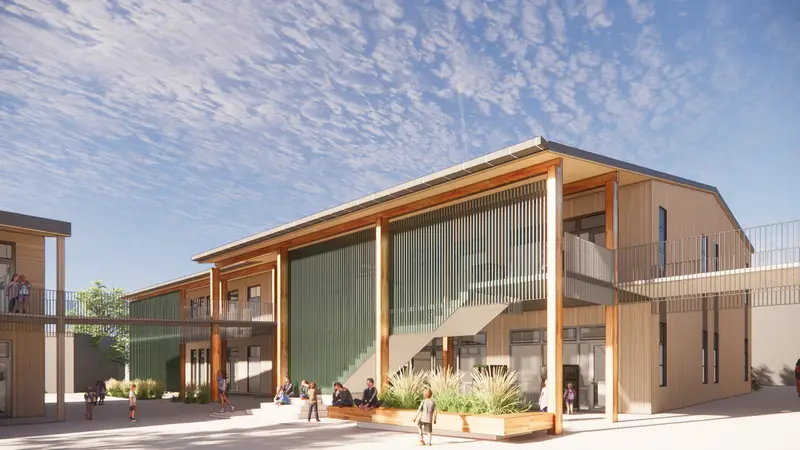Ministry of Education Carbon Assessment Study
Jasmax is part of a transformational pilot study led by the Ministry of Education (MoE) to reduce the carbon impact in school design and construction. The aim of this study is to investigate and compare the lifecycle carbon of a range of school designs to determine the feasibility of carbon reduction strategies and produce practical low-carbon designs for future schools nationwide.
MoE aims to minimise upfront, or embodied carbon, in new schools with a proposed target of 500kg CO2eq/m2. The average embodied carbon in a typical steel and concrete school design currently is 750kg CO2eq/m2, so this target represents a carbon reduction of approximately 33%. By involving sector experts, design and cost consultants, this ground-breaking study will test whether the new target is feasible and practically achievable using modern materials and construction processes.
As part of the study, Lifecycle Carbon Assessments (LCAs) are being undertaken on around 20 new school designs by six contributing architecture practices across Aotearoa New Zealand, including six projects designed by Jasmax. The assessment data will help MoE to understand the best performing materials and construction systems and will also track which systems are most cost effective.
Tackling carbon reduction at the portfolio level will help MoE intelligently and strategically reduce carbon within school construction programmes. “This study, spearheaded by the Ministry of Education, marks an exciting milestone for the education sector and will transform the way we design sustainable schools in and for the future,” says Jasmax Principal, Chris Scott.
At the study’s outset, Jasmax proposed and developed an industry-wide Carbon Reporting Template in conjunction with Building Research Australia New Zealand (BRANZ) and MoE to ensure that irrespective of the carbon calculator used by different consultants (e.g. LCA Quick, eTool, Oneclick LCA), there will be greater consistency in assessment and reporting across all projects. The template is being tested by participants in the pilot study with the vision to implement it across all MoE projects.
Importantly, this pilot study ensures that upfront carbon assessment will become an integral part of the design process.
Jasmax projects in the study, such as the upcoming new block for Mahurangi College (pictured below), are using alternative mass timber construction and prefabrication systems. LCAs and the Carbon Reporting Template are being used to help determine how well these systems (including CLT and Glulam structural systems) compare with alternatives such as conventional timber framing, steel and concrete, to reduce carbon and improve construction timeframes. These innovative approaches to construction will inform the next generation of low carbon school design.
